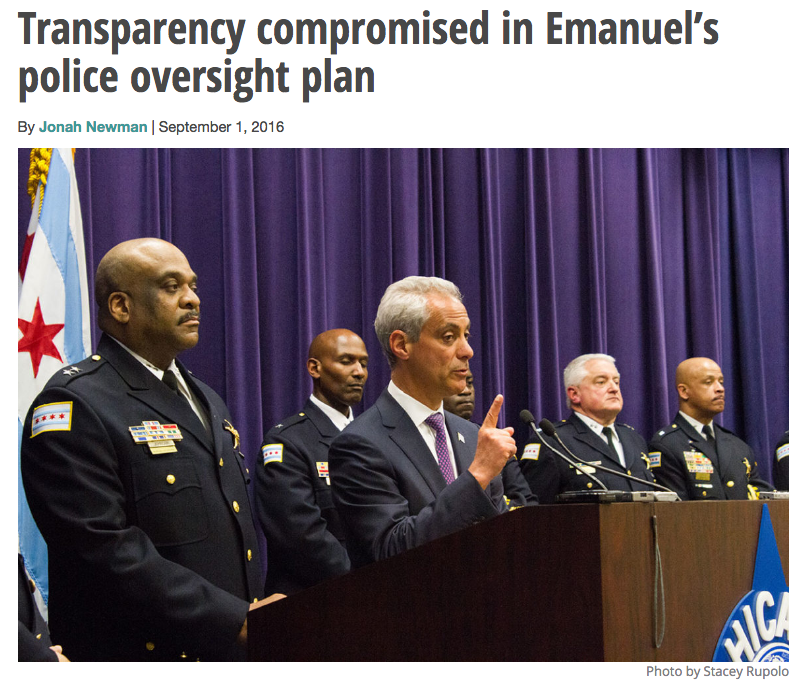Vol. 2, Issue 13: Deconstructing the City's Civilian Office
At Issue: Independence
Mayor Emanuel filed a proposed ordinance establishing a Civilian Office of Police Accountability (COPA) and an inspector general for public safety last week.
The ordinance “ensures the mayor’s office will retain a significant measure of control in how cops are investigated and disciplined,” the Tribune reported. Advocates of police reform pressed for changes to enhance the independence of the two new agencies.
Text of Emanuel’s ordinance, a side-by-side comparison of the three competing ordinance proposals, and full community meeting transcripts are available at IPRA Tracker.
City Council members reported progress on allowing COPA to hire its own independent counsel, rather than going through the city’s law department, which represents the city and police officers in misconduct lawsuits.
CHOOSING THE CHIEF: But major issues remained unresolved. The biggest may be the process for selecting COPA’s chief administrator. Emanuel’s ordinance does not address the question, pending further hearings and another ordinance establishing a civilian oversight board, which is expected to play a role in the selection process.
Ald. Leslie Hairston (5th) and Ald. Chris Taliaferro (29th) expressed reservations about the missing elements. Citing the history of ineffective oversight agencies with administrators appointed by the mayor, Taliaferro said, “we have the same thing again” under Emanuel’s ordinance, in which IPRA administrator Sharon Fairley will initially head COPA. “I’m looking for the differences.”
“You can’t do this piecemeal,” Hairston commented.
The delay in considering the community board comes at the request of a coalition of community groups and civil rights organizations, which echoed the recommendation of Emanuel’s Police Accountability Task Force that details about the community board’s composition and powers “be developed with broad public input.”
The Chicago Civil Rights Coalition for Police Accountability, a coalition of civil rights groups, has proposed that the community oversight board have the power to appoint the head of COPA after holding public hearings, said Paul Strauss of the Lawyers’ Committee for Civil Rights.
The coalition has also called for barring former employees of CPD or the Cook County State’s Attorney’s Office from serving as COPA staff; taking steps (including amending state law) to allow civilians to file complaints without signing affidavits; requiring the discharge of officers who retaliate against civilian complainants or lie during an investigation; and requiring COPA to hold quarterly community meetings and conduct educational outreach, Strauss said.
BUDGET: A brief debate over COPA’s budget emerged between two reform proponents: Police Board President Lori Lightfoot, who chaired the Police Accountability Task Force (PATF), and Craig Futterman of the Civil Rights and Police Accountability Project at the University of Chicago Law School’s Mandel Legal Aid Clinic. (The Mandel Clinic is a partner of the Invisible Institute, which publishes this blog.)
Lori Lightfoot addresses the public at an August 11 community meeting in Little Village (Photo by Vidura Jang Bahadur)
Futterman called the mayor’s proposal “a recipe for failure” because it lacks a budget that is insulated from the political process and large enough to manage a significantly increased workload. Lightfoot, however, argued that Futterman’s proposal to allocate 1.5% of the police department’s budget to the new agency “makes no sense.” She stated that COPA and the new inspector general “should have enough resources” but added, “it’s got to be a number that’s actually doable.”
Lightfoot’s task force recommended that the new oversight agency be guaranteed 1% of CPD’s budget or maintain a staffing ratio of one investigator for every 250 sworn officers. The budget guarantee would amount to $14 million per year, compared to IPRA’s current $8 million allocation. However, with 12,000 officers, PATF’s recommended staffing ratio would provide COPA with only 48 investigators—fewer than IPRA currently has.
IPRA currently employs 52 investigators, falling well short of the 79 positions that are budgeted. That number is widely considered inadequate for managing its current caseload, contributing to large backlogs, lengthy delays, and an overreliance on plea-bargaining. As proposed, COPA would have a significantly larger caseload than IPRA. Emanuel’s ordinance would transfer thousands of complaints—currently handled by CPD’s Bureau of Internal Affairs (BIA)—to COPA, including cases involving unlawful stops and arrests and denial of counsel, substantially reducing BIA’s workload. Additionally, the ordinance includes extensive new responsibilities related to pattern analysis, database maintenance, and public reporting.
INSPECTOR GENERAL: Faith leaders from the Community Renewal Society raised similar concerns regarding the proposed inspector general, calling for an independent selection process for the deputy in charge of the office, guaranteed funding, and greater transparency.
Concerns about transparency in the proposal for an inspector general for public safety were further underscored when CPD denied a request from the Chicago Reporter for a copy of the Chicago Inspector General’s report recommending the firing of officers who allegedly covered up the shooting of Laquan McDonald. CPD cited state law exempting inspector general reports from the Freedom of Information Act (FOIA).
The Chicago Reporter
However, the FOIA exemption invoked by CPD may not actually apply to the inspector general’s report once it is in CPD’s possession, according to an informed source. That provision applies to local inspector generals but not to the public agencies that receive their reports.
Additionally, the new inspector general for public safety would be responsible for conducting audits and reviews—reports of this nature are routinely published by the city’s inspector general.




